#the tin can inspires me with writing in a way no character ever has previously
Text
Four years ago today I watched The Mandalorian for the very first time!
It's a date that I will always remember because it was the first day of the national lockdown here in the UK. Luckily, it also coincided with the launch of Disney+.
I was already a Star Wars fan, so I wanted to watch the show when it premiered but it didn't launch here at the same time. But I vividly remember waking up one cold, dark morning in November and being confronted with Baby Yoda everywhere I scrolled. He definitely made me smile and made that particular commute a lot more bearable!
I was desperate to watch it but honestly, I was too busy drowning in work during my final year of University to sail the high seas. So, I waited.
And I'm so glad I did.
I truly feel like this show and the character of Din Djarin came to me at a time in my life when I needed him most. 2020 was a terrible time for me, as I'm sure it was for plenty of you, too. So being able to watch a new Mando episode watch every week was a rare bright spot in all of the darkness.
I remember leaning forward in my seat when Din repelled the Ravinak with the Amban rifle, the tension was real! But I was truly hooked when he grabbed the Mythrol and froze him in carbonite.
Who is this guy? Is he good? Is he bad?
Honestly, I still feel like I don't know for certain and I love that about the character.
It's hard to believe it's such a short amount of time while it also feels so long ago. I think that's true for most of us but I truly feel like I have lived several lifetimes since 2020. Some good, most bad.
Throughout it all, though, I've always had The Mandalorian to watch when I needed a bit of comfort and escapism from the real world. I don't think I can put into words how much joy watching it brings me, but I know you all feel it too.
I'm truly so delighted that I created this blog and carved out a little corner of the internet for me to ramble about all things Mandalorian with some fellow freaks [affectionate]. It's definitely going to help me get through the wait until the movie in 2026... it actually hurts to think that I saw SIXTEEN EPISODES in 9 months in 2020 but anyway...
Wanted to thank anyone who has ever interacted with me or said a kind word about anything I've posted in the few months I've been here. I really appreciate it! I'm so glad we all found The Mandalorian and Din in our own ways and it brought us all here together.
If anyone would like to share their own stories of how they first watched the show, I would love to hear them!
Anyway, Happy Fourth Mandoversary to myself and, as always:
save me din djarin.... din djarin save me..... save me din djarin......
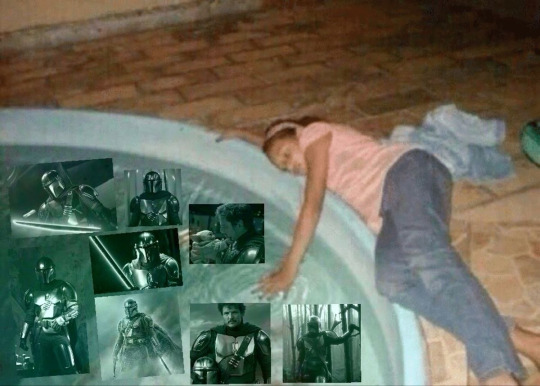
#din djarin#the mandalorian#text post#spud rants#miss him so much it's SICK AND TWISTED HOW AM I MEANT TO LIVE WITHOUT THIS SHOW#come home din the kids miss you#also oneshot coming later tonight its angsty and soft and cannot wait to share it bc i'M SO PROUD IF IT AAAAH#the tin can inspires me with writing in a way no character ever has previously#he is the ultimate blorbo
17 notes
·
View notes
Text
Monday Music: Parekh & Singh / Wes Anderson & Colonial Legacy

A lovely, little group to stumble across as the summer nights linger a little longer than we deserve in the northern hemisphere and we have need of songs with which to further enjoy the lengthened twilights and unnamable oranges and pinks which play on clouds or air pollution, depending on your location.
youtube
The venn diagram of people who would enjoy Parekh & Singh and people who would enjoy quirky coming of age comedies with an OCD level of attention to whimsical detail and the meticulous direction of Wes Anderson, has a large overlap, as you can see in the chart below.
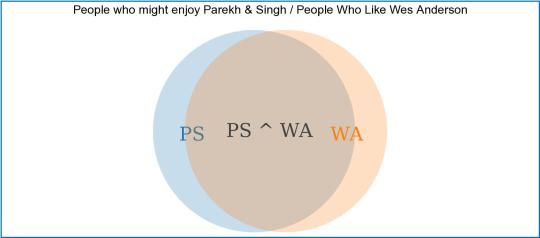
It is then a smart branding move of Parekh & Singh, with their perfectly pocket sized indie dream pop tunes to make music videos in tribute to Wes Anderson, the divisive, brilliant auteur, and favorite of the indie set.
I quite like this music. It’s good. But, what I find really interesting here, is thinking about Wes Anderson’s films and specifically the criticism he faces when it comes to his handling of minority and foreign characters, especially in the context of two Indian guys taking his work, which at times has indeed, been questionable, especially in its portrayel of Parekh & Singh’s fellow countrymen, and other south asians.
youtube
I’m an ardent W.A. fan, but I do not mind if people jump on Anderson for Gene Hackman’s character being openly (and hilariously) racist in Royal Tenenbaums or if they have a problem with Owen Wilson’s Custer obsessed, war paint donning character in the same film. In all honesty, the mention of the tongue-in-cheek “Chick-chaw” trail in Moonrise Kingdom always makes me cringe, even though I love that film. I appreciate when people are aware enough to point out uncomfortable moments of appropriation in his films and I do not make apologies for him. But, I personally don’t get too bent out of shape over that stuff when it pops up in movies, especially when I think that this director (white man, he may be) is smart enough and sensitive enough to be pointing out the problems of race in society through showing cartoon versions of racism. My argument would be that Anderson doesn’t get race right all the time, but he might actually be doing better work with it than we might have previously thought, given the knock that Wes Anderson and White are synonyms.
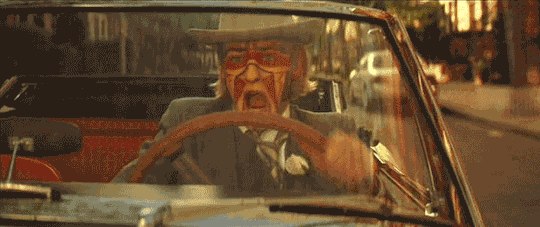
(Eli Cash high on mescaline wearing war paint, Royal Tenenbaums)
Take Royal Tenenbaums. Hackman’s character Royal is an admitted “asshole” after all and his racism is a part of that lost old white man-ness of his character. Eli Cash, Owen Wison’s character, and the other great offender within the ensemble cast, is a drug addicted sendup of white academics who get way to deep into the culture they “study,” and go totally off the rails, wearing funny hats and in Cash’s case, writing in a “sort of obsolete vernacular.” The one prominent black character in any of Anderson’s ensemble casts is Henry Sherman, played by Danny Glover. Sherman certainly is largely there as a target for Hackman’s racist comedy (”Coltrane,” “You want to talk some jive!? I’ll talk some jive!”) but Glover’s character is also successful accountant and ends up marrying Royal’s wife, played by Anjelica Houston, which obviously upends a lot of stereotypes of black folks in cinema.
youtube
(The great back and forth between Glover and Hackman, Royal Tenenbaums)
Thinking about it now, I actually think Royal’s racist moments, are not only for easy-ish laughs, but to also identify him as a man out of time, as a tragically flawed hero. In many ways, Royal Tenenbaums is a very American movie, about a family which chases innovation and prestige, dedicating itself to upholding a strong protestant work ethic, only to come up short despite all of their talent because in the end the world is hard and we are all broken to some degree, and all that really matters is love and tending your own garden, as Voltaire might say. The tragedy and triumph of F. Scott Fitzgerald’s writing and life sings throughout all of Anderson’s American set films (especially in RT and Rushmore, which was inspired by Fitzgerald’s “The Last Tycoon”).
What better sin to possess the patriarch of this dying star of an American family with than a kind of dwindling, last gasp of the white supremacy. Royal has to overcome many things in order to redeem himself by films end -- abandoning his family -- but he also must overcome a bigoted white machismo, as he finds himself outmatched not only by a changing, more progressive society, but also more directly by a strong, smart, and handsome black man, who has won the heart of his wife, because he is a better man than our hero could ever be.
Just because an issue is dark and complicated, doesn’t mean it can’t serve well in a colorful comedy--see the way Anderson also handles mental illness, anxiety and suicide in this film, in a way which doesn’t drag the proceedings into total despair, or interrupt the pace, or comedic stability of the overall work, but at the same time, does not treat these topics as inconsequential, but in fact addresses them with respect.
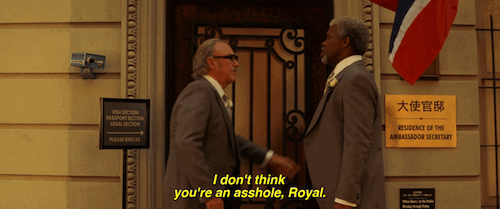
(Royal Tenenbaum and Henry Sherman making amends, Royal Tenenbaums)
In short, I think it’s fair to criticize Anderson. If you just don’t like his style, fair, his talent may not engulf you the way it does myself and other fans, and this certainly alters how we view his appropriation, or how he writes for characters of color. I get it. It’s fair to cry foul over a movie like Tarantino’s Django Unchained, and say, maybe, white film makers just shouldn’t put words into the mouths of black actors when explosive issues of race are involved. I can respect that because it comes from a position of historical knowledge in which, taking in the scope of slavery, anti-blackness, civil rights, and white supremacy, it’s almost too much to deal with, and honestly, who needs a white guy trying to write blackness onto the screen, especially when plenty of black filmmakers don’t get the same shot.
If you don’t like Anderson’s precious, meticulous aesthetic (or Tarantino’s over the topness, for that matter), which I can understand, his inclusion of minorities and foreigners (which he has made a space for since his first film) is an easy target. But I think it’s worthwhile to consider this: W.A. is a white dude writing racially charged dialogues and characters, but what is that dialogue and what are those characters doing?
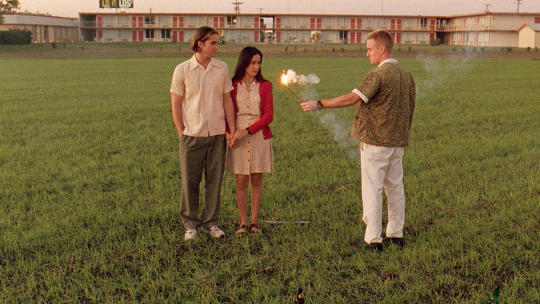
(Anthony, Inez, and Dignan from Bottle Rocket)
I met Wes once, at an NPR office of all places, and so I picture his tired but kind, press tour handshake and smile, when I think of him as I write this. He wears his influences on his sleeve. A white, liberal boy from Texas with a hard on for 60s European cinema and British folk/rock music, who is a nice guy in an expensive camel hair blazer. A soft voiced auteur who seems both normal and a bit snobby, with a singular vision within filmmaking.
Still, I can sympathize with those critics who call him out, and I don’t necessarily disagree with their points. It’s important to have watchdogs out there to not let people get away with shit concerning race, because some really serious, bad stuff can go down if marginalization is the norm, like life or death stuff, not just annoyances from silly movies. Although, I do feel bad for these critics if they haven’t experienced the brilliance of Rushmore, the first movie I remember sitting down and watching and afterwards, coming out of the theater, telling my buddies Josh and Phillip, whoa, that was like a really good film.
youtube
(”Payback Scene” from Rushmore, featuring The Who’s “A Quick One While He’s Away”
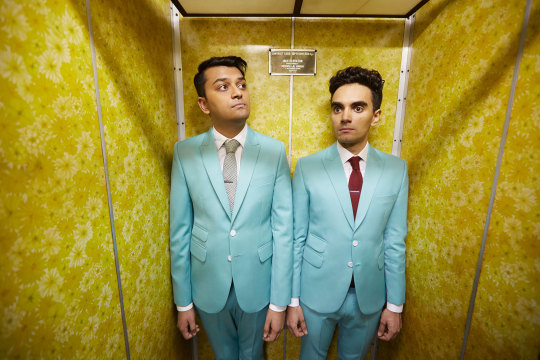
So, back to Parekh & Singh... Two private school kids from Kolkata who do the indie dream pop thing as well as anyone in the states or Britain, with no trace of an accent. Obviously, British colonialism has left a trace on these guys. Is that a bad thing? Well, I sure like this music, and judging from their pin-point accuracy in performing this style, they sure like British music and have studied the great indie pop of the 90s and 00s from the isles and stateside. And what does their adoption of the Anderson aesthetic in their promotional videos and photographs say? Well, obviously, like many indie pop fans, they enjoy his films. It’s an eye catching visual to replicate and it got my attention, as I would imagine it got many of the hundreds of thousands of people who have viewed their videos’ attention.
The intrigue arrives when we consider that Anderson’s least successful film, both as a film and a cultural product handling race, is Darjeeling Limited. It’s his most exploitative work by a mile, setting a story of three rich white brothers (played by Jason Schwartzman, Owen Wilson, and Adrian Brody) on a farce of a spiritual journey to reconnect with their nun-mother who is living somewhere in India. They travel by train and India, like classic films from the 50s and 60s, stands in for the “exotic” locale where rich white people find out something.
youtube
(Darjeeling Limited trailer)
There are two supporting actors of south asian descent on the train --which serves brilliantly from a cinematography point of view as the main setting-- played by Amara Karan and Waris Ahluwalia, but they have little more complexity than the colored folks in a Tin Tin comic, that is to say not much (that is to also say, I cherish my Tin Tin comics, even Le Lotus Bleu.)
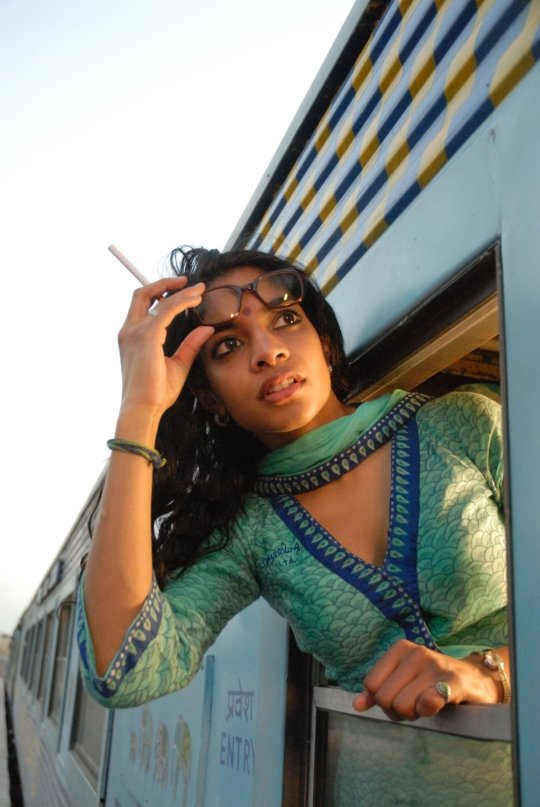
(Amara Karan plays “Rita” in Darjeeling Limited)
The criticism of Anderson, privileged, white boy director, is most founded here. The movie--rewatching some scenes, now--still has a ton of great moments, though the script is more uneven than his best work (especially the films cowritten by Owen Wilson) and the chemistry between the leads is not great. But when it comes to his treatment of India, there are a number of head shaking moments to choose falling into the cliches of bad, racist costuming, cultural mishandling (especially in terms of religion), exoticization of "oriental” women, white savior complexes, and the fact that the country is little more than literal window dressing from the inside of a train, a liminal but safe compartment from which these three western brothers bicker like children and try to find meaning while taking drugs, fucking hot chicks, and being tourists playing at the Beatles-y spirituality which so many westerners define India by. So, criticism deserved on this one, I say. It’s one thing when W.A.’s setting is Brooklyn or a prep school, because Anderson has some ownership over this cultural context. He has very little ownership over India. He took a trip there, enjoys Bollywood, but the conflation of the country and the superficiality with which he treats it, especially given how necessarily superficial and visually focused his movies are, that’s a little bit of a deal.
Still, some great scenes, amazing shots, great use of The Kinks, and funny lines.
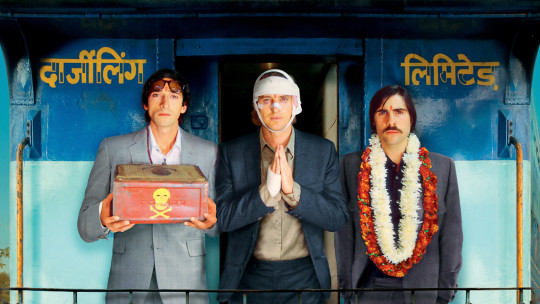
(Brody, Wilson, and Schwartzmen in Darjeeling Limited)
So, the question I would love answered is what do Parekh & Singh think, as Indian dudes who love Wes Anderson about Darjeeling Limited. They probably love it, the same way, as an east/southeast asian dude, I really like Karate Kid or don’t actually mind Last Samurai, because 1.) Tom Cruise is fucking awesome always (in movies) and 2.) it’s a fucking movie and my outrage is better spent elsewhere. But, perhaps there’s something more annoying about Anderson’s missteps in Darjeeling than those hollywood blockbusters precisely because Anderson wears a camel hair blazer to an NPR interview with Robin Young. Artsy, bookish liberals are supposed to know better where big hollywood productions don’t give a shit about race sensitivity and just want to make money, so, duh, Tom Cruise totally should be the centerpiece of a movie that takes place in Japan. Still, I’m curious what Parekh and Singh would think (I’ve also texted several south asian friends on their Darjeeling feelings, realizing I’ve never asked).
Anderson’s aesthetic is highly colonial. He loves the prim and proper style of the British Empire, the bright colors of the military uniforms, and the organization inherit in Britain’s grotesque domination of much of the world in the 19th and 20th century.
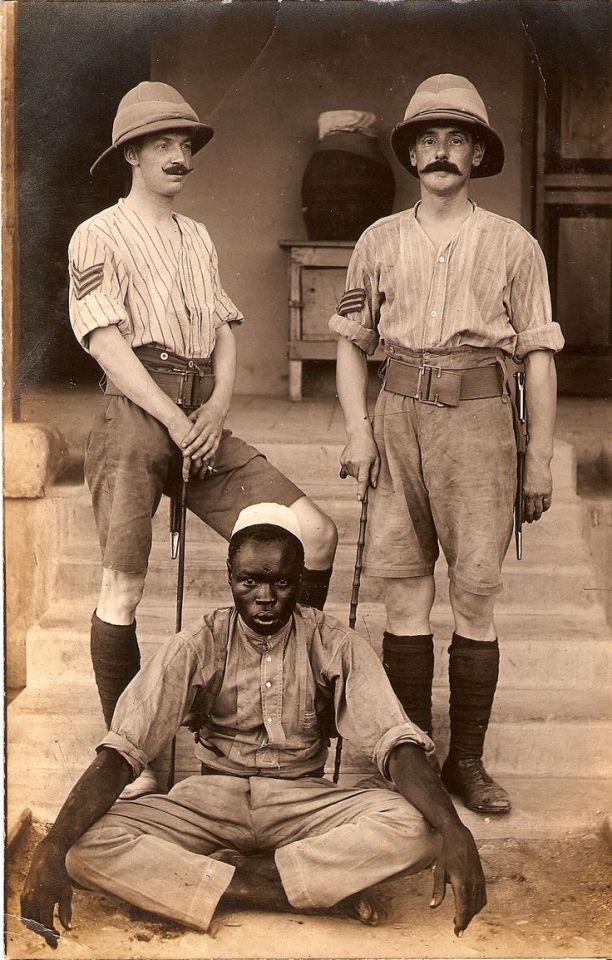
(British Colonial style)
Musically, Anderson’s heavy use of 1960s British music is interesting because it came at a pivotal time in British and western history. It was the soundtrack of a dying Empire and an emerging globalized (American) world. I ask myself, was the British Invasion with all of its appropriation (Rolling Stones=Blues, then country, Kinks=Rock, Hillbilly) the swan song of an empire or a the sonic marking of a sea change towards a more progressive society?
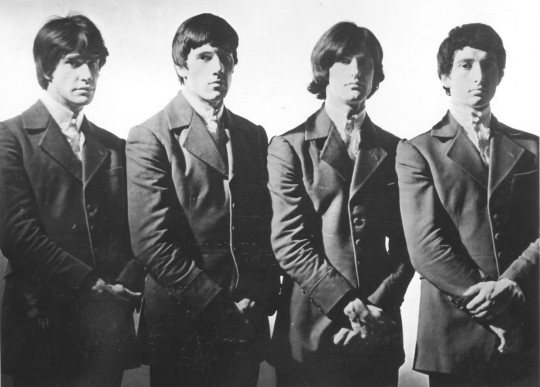
(The Kinks)
Concerning film, Anderson borrows heavily from French New Wave cinema and classic Italian masters, and we must ask, similarly to his British Invasion admiration/fetish, is this a continuation of brilliant but white-washed and colonial film making in the guise of mid century cultural change within these respective western european countries, or was this film making truly pushing towards a more culturally inclusive and aware future?
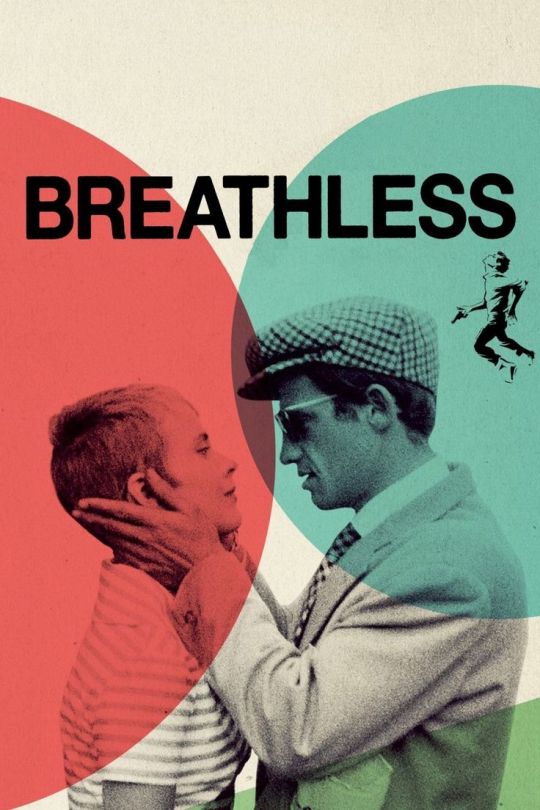
(Seberg et Belmondo, A Bout de Souffle (Breathless))
So, again, Parekh & Singh: Sons of colonial subjects taking the culture of their former conquerers and making their own music, or subjects of a continued colonial legacy? Probably both. Having grown up Vietnamese, but fully appreciating the French culture my mother was born into in Saigon, I don’t think it’s such an easy thing to demarcate. French culture is my culture, even if, I think French colonialism was bullshit, horrible, and wrong. British culture is Indian culture for some Indians, probably moreso of upper class kids like Parekh and Singh, and their private school crowd. No judgement on any individual actors. By looking at their work, as well as Anderson’s we can take a minute to reflect on the deeply engrained transnational, colonial influences, and the good and bad of this legacy in art, and in the world.
At the end of the day, this is talented group making good tunes and using a popular director’s style to promote their music, and I’m fine leaving it there. As an academic-ish, I do appreciate their videos for making me think more deeply about Anderson’s work and history, I guess.
Also, I want to mention, that, after Darjeeling Limited and the ultra-white, school boy fantasy Moonrise Kingdom (a great film, despite the “Chick-chaw trail), I really loved Anderson’s next film Grand Budapest Hotel featured Tony Revolori, a Guatemalan-American actor as the film’s hero. I’m sure Parekh & Singh, like myself, appreciated seeing a brown skin kid as their hero, especially in what was perhaps Anderson’s best work to date.
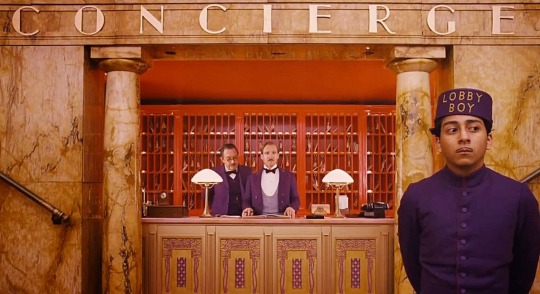
(Tony Revolori as Zero in Grand Budapest Hotel)
0 notes